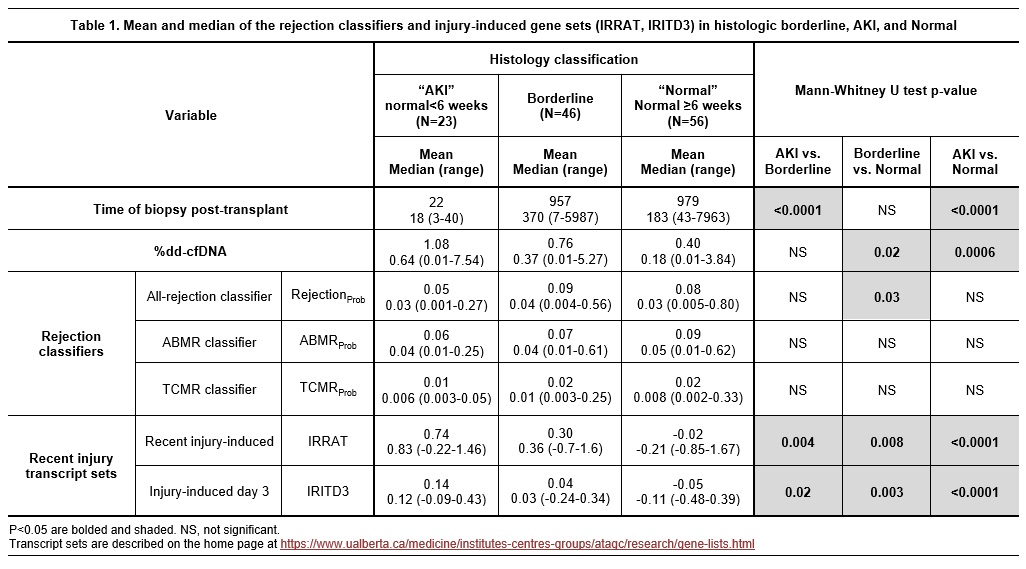Histologic Borderline Reflects Molecular Injury Not Rejection: Results from the Trifecta Study
1Alberta Transplant Applied Genomics Centre, Edmonton, AB, Canada, 2Natera Inc., San Carlos, CA, 3., ., AB, Canada
Meeting: 2022 American Transplant Congress
Abstract number: 1671
Keywords: Biopsy, Kidney transplantation, Rejection
Topic: Clinical Science » Kidney » 34 - Kidney: Acute Cellular Rejection
Session Information
Session Name: Kidney: Acute Cellular Rejection
Session Type: Poster Abstract
Date: Tuesday, June 7, 2022
Session Time: 7:00pm-8:00pm
 Presentation Time: 7:00pm-8:00pm
Presentation Time: 7:00pm-8:00pm
Location: Hynes Halls C & D
*Purpose: In the Trifecta study (NCT04239703), we recently compared indication biopsy diagnoses (MMDx and histology) and plasma %dd-cfDNA levels for indication biopsies (JASN in press 2021), showing strong correlations with molecular rejection and weak correlations with recent parenchymal injury. The present study addressed the relationship between molecular assessments and %dd-cfDNA levels in biopsies called “Borderline” by histology.
*Methods: We used an expanded set of 426 biopsies with %dd-cfDNA results. Biopsies were read for histology per local center standard of care, for MMDx at ATAGC, and dd-cfDNA at Natera.
*Results: Of 426 biopsies in Trifecta, histology diagnosed 46 as Borderline, 56 as no major abnormalities >6 weeks post-transplant (here called “Normal”), and 23 as no major abnormalities <6 weeks (here called “AKI”). Histologic Borderline biopsies were rarely called rejection by MMDx: 44/46 were MMDx No rejection, one was ABMR and one was possible TCMR. In Table 1, AKI was early but Borderline and Normal were similar in time post-transplant (mean, median, and range). There was a gradient of decreasing %dd-cfDNA from AKI to Borderline to Normal. AKI, Borderline, and Normal differed little in their rejection classifier scores: the RejectionProb, ABMRProb, and TCMRProb classifiers scores were similar with no consistent gradient, including Borderline vs. Normal. Thus %dd-cfDNA gradient did not correlate with undetected molecular rejection changes. However, there was a gradient in injury-related transcript set scores, highest AKI, intermediate in Borderline, and lowest in Normal. This corresponded with the gradient in %dd-cfDNA.
*Conclusions: We conclude that histologic Borderline is a minor inflammatory state associated primarily with mild molecular injury changes rather than molecular rejection changes. Borderline may be a late consequence of earlier injuries. The mildly elevated %dd-cfDNA in Borderline vs. Normal is probably a reflection of parenchymal injury. Thus Trifecta results indicate that histology Borderline biopsies have mildly elevated %dd-cfDNA, like early AKI, but should not be managed as rejection.
To cite this abstract in AMA style:
Halloran PF, Madill-Thomsen KS, Demko Z, Prewett A, Billings P, Gauthier P. Histologic Borderline Reflects Molecular Injury Not Rejection: Results from the Trifecta Study [abstract]. Am J Transplant. 2022; 22 (suppl 3). https://atcmeetingabstracts.com/abstract/histologic-borderline-reflects-molecular-injury-not-rejection-results-from-the-trifecta-study/. Accessed February 16, 2026.« Back to 2022 American Transplant Congress

